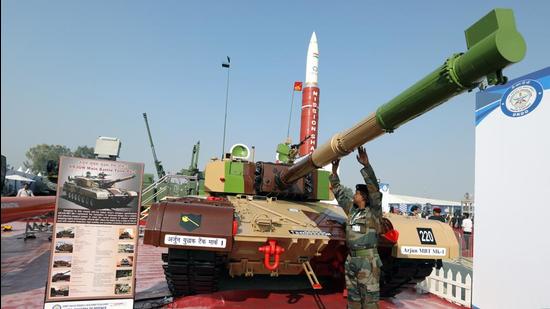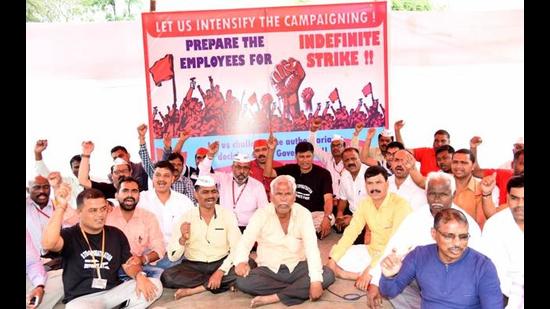With the corporatisation of the OFB, uncertainty and fear run high among workers
Corporatisation means a different structure altogether, comes with financial and commercial implications, and needs to be effectively sold to the roughly 80,000 employees of the 41 factories who are nervous about what comes next.
Last Wednesday was a holiday at Rifle Factory, Ishapur (RFI), 40 km from Kolkata, one of the 41 government-owned ordnance factories that will be corporatised and become units of seven State-owned companies from Thursday.

“We worked last Sunday,” said a junior works manager at the factory, explaining the holiday. And Friday, October 1, marked a new beginning. “The new signboards have arrived. These will be put up before Thursday, when the corporate entities become operational,” the manager added, on condition of anonymity.
At the headquarters of the Ordnance Factory Board (OFB) in Kolkata, officials were in meetings through the day and late into the evening on Wednesday, hammering out last-minute details of an announcement made by the Union government earlier this week — but also one for which OFB has been preparing for some time.
The implications of corporatisation
Corporatisation means a different structure altogether, comes with financial and commercial implications, and needs to be effectively sold to the roughly 80,000 employees of the 41 factories who are nervous about what comes next.
According to the Union government’s plan, Advanced Weapons and Equipment India Limited will have eight units, including RFI under it; Munitions India Limited (ammunition and explosives) will have 12; Armoured Vehicles Nigam Limited, five; Troop Comforts Limited, four; Yantra India Limited, eight; India Optel Limited will manufacture optics and electronics at three factories; and Gliders India Limited will have one parachute making unit.
Rajesh Choudhary, chairman and managing director (CMD) of Advanced Weapons and Equipment India Limited, one of the new entities made it clear at a virtual board meeting on September 18 that “the company would no longer be funded by the government of India’s budget and will have to arrange its own working capital.”
“Indents are being converted into contracts and 60% of the value of the confirmed contract for this financial year up to March 31, 2022, will be given as advance by the (armed) forces as working capital and the balance 40% shall be realized as and when actual issues (deliveries) are made. Therefore, expenditure has to be linked to monthly issues and strict control on expenditure is to be exercised to limit the expenditure within the earnings,” said the minutes of the meeting, a copy of which has been reviewed by HT.
“The factories were advised to make concerted efforts for liquidation of all outstanding liabilities before September 30, 2021. The wages of the industrial employees (including overtime for September) should be paid before September 30, 2021,” according to the minutes.
The move to corporatise OFB across seven State-owned companies comes after almost two years of protests by employee unions.
Understandably, anxiety runs high. “I was involved in the production of the INSAS assault rifle which, despite all criticisms, helped us win the Kargil War. We are now producing a 7.62 mm advanced version. We fear that many workers from the production line might be asked to retire. Senior officers, who addressed us on August 15, could not give any clear idea on how the corporate model is going to work,” said a second RFI employee who did not want to be named.
Protests against corporatisation began in 2019, and intensified in May 2020, when the plan was formally announced. Protests are being led by the All India Defence Employees Federation (AIDEF), the Indian National Defence Workers Federation (INDWF), and the Bharatiya Pratiraksha Mazdoor Sangh (BPMS) — the three recognized unions — representing OFB’s 80,000 civilian employees. BPMS is affiliated to the Rashtriya Swayamsevak Sangh (RSS). There are two more non-recognised unions.

The employee unions held a referendum at all 41 factories and OFB headquarters earlier this month. In a letter to Union defence minister Rajnath Singh on September 29 wrote, “Out of 61564 employees who participated in the referendum, 61199 employees have voted against the government’s decision. Only 365 employees have voted in support of the corporatisation.”
On October 1, employees at all 41 factories wore black badge, held meetings with black flags outside the gates and boycotted lunch, the unions said in a joint statement. Members of the officers’ association also joined the lunch boycott programme, the statement said. “The unions will meet this week to discuss their next plan of action,” C Srikumar, general secretary, AIDEF, told HT on Sunday.
A senior defence ministry official, who did not wish to be named, told HT that Rajnath Singh held several meetings with the unions and assured them that salary, perks and other benefits of the employees will remain the same. “One must change with time. The unions have to understand that the new structure will give the units more autonomy. They can take independent decisions. Our aim is to change the structure of the management.”
The right to protest
But there is a larger issue at play, one that employees are very conscious about: Can they even protest?
In Kanpur, much like in other centres, much of the conversation in the five OFB units, Field Gun Factory, Small Arms Factory (SAF), Ordnance Equipment Factory (OEF), Ordnance Parachute Factory (OPF), and Ordinance Factory (OF), is actually about the right to protest itself.
On August 3, the government passed the Essential Defence Services Act 2021, and a gazette notification on this was issued on August 12, barring employees working in the sector from protesting. “This has denied us the right to protest something that is fatal for the factories and the 7000 employees in Kanpur,” said KK Tiwari, general secretary, SAF employees’ union. “We were protesting tooth and nail before this act was enforced. Now everyone is scared.”
On August 22, the act was challenged in the Delhi High Court, which did not stay the government’s decision. “We are moving to the Supreme Court as the act discriminates against the right to equality. Why such an order denying us the right to protest was enforced in [the] defence establishment, not others? This gagging is deliberate to ruin this sector and help the private players usurp it up,” alleged Mukesh Singh of Bhartiya Pratiraksha Mazdoor Sangh, a body of the RSS.
The defence ministry official HT talked to did not comment on the court proceedings. “I have not gone through the Delhi High Court order, but I read somewhere that the court also felt that defence production cannot be allowed to be affected. So, the order is in harmony with the government’s view,” he said.
Employees at SAF said that there is a great deal of anger at the decision, and that the sector shouldn’t be looked at “from the prism of profit and loss”. “In our case, we will fare worse [than BSNL, which was corporatised in 2000, and has since fared badly] because BSNL had a customer base and we don’t,” said Singh. “In two years, the fear is that the government will declare these units non-profit making and work orders would pass on to the private companies. This is the plan,” said Singh.
At the unit in Khemariya, Jabalpur, workers pasted posters titled “Shok Diwas”(day of mourning) for October 1, arguing that the government has left them no wiggle room, and that they are being forced to accept the decision. “I joined here, leaving a lucrative job at an MNC [multinational corporation] as I preferred job security, but now I am not seeing a bright future here,” said an engineer at the unit who asked not to be named.
Mixed reactions
Arun Dubey, vice-president of the Defence Employees Federation, who spent Wednesday standing at the gate and asking fellow employees to paste posters said, “I have been working in the factory for the past 37 years and I have not seen that much fear in the minds of employees.”
Jabalpur has four ordnance factories — Ordnance Factory, Khamariya, Gun Carriage Factory, Jabalpur, Vehicle Factory Jabalpur, and Grey Iron Foundry in Jabalpur — employing around 14,000 people.
At the Ordnance Cable Factory in Chandigarh — which employs 500 people — there is a nervous quiet, but a greater acceptance of the decision after assurances from the top brass.
Employees that HT spoke to said that the change had been on the anvil for many years, and while there were initial protests, those have since died down. “Initially, we feared losing jobs and uncertainty prevailed but now we are being assured that employees’ interests will be safeguarded. The new regime may bring in accountability, autonomy and efficiency. One will have to deliver to survive while most of the service conditions remain unchanged,” one employee said on condition of anonymity.
(With inputs from Shailee Dogra and Monika Pandey)
All Access.
One Subscription.
Get 360° coverage—from daily headlines
to 100 year archives.



HT App & Website






